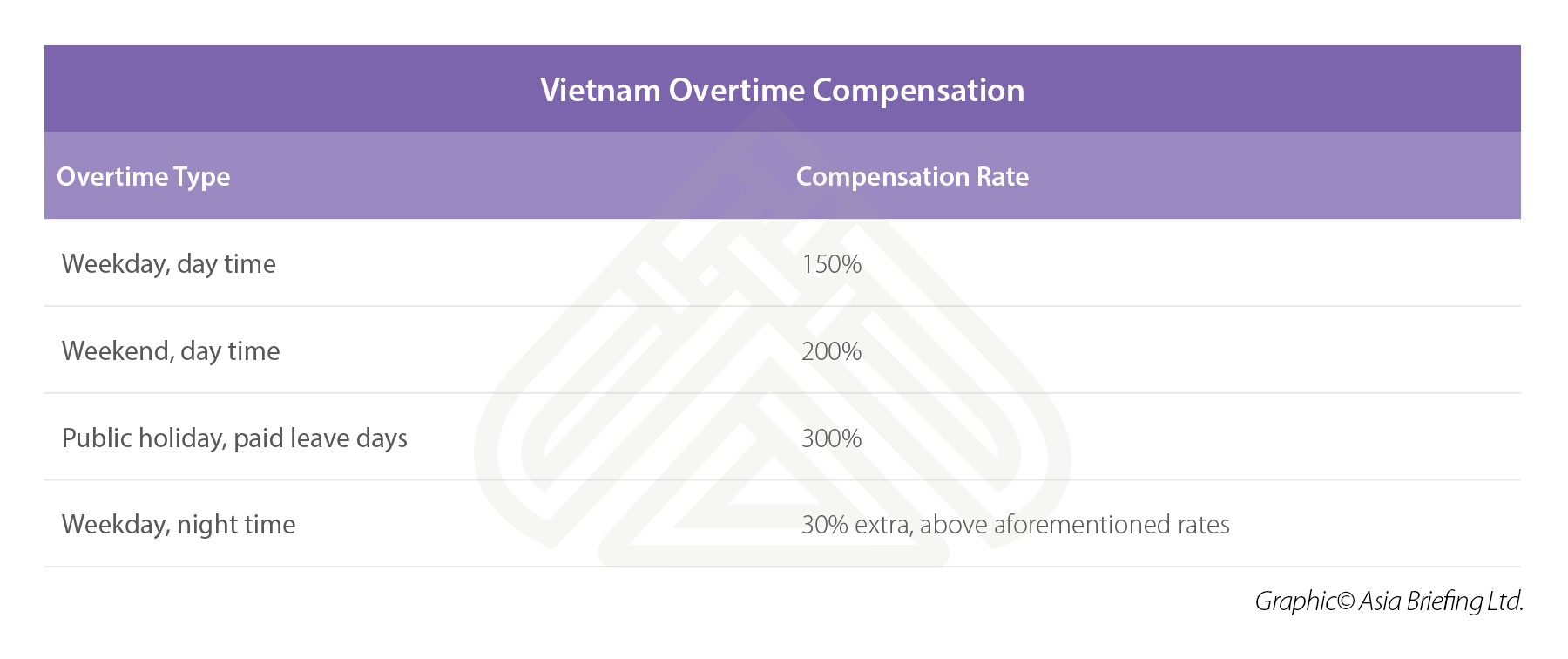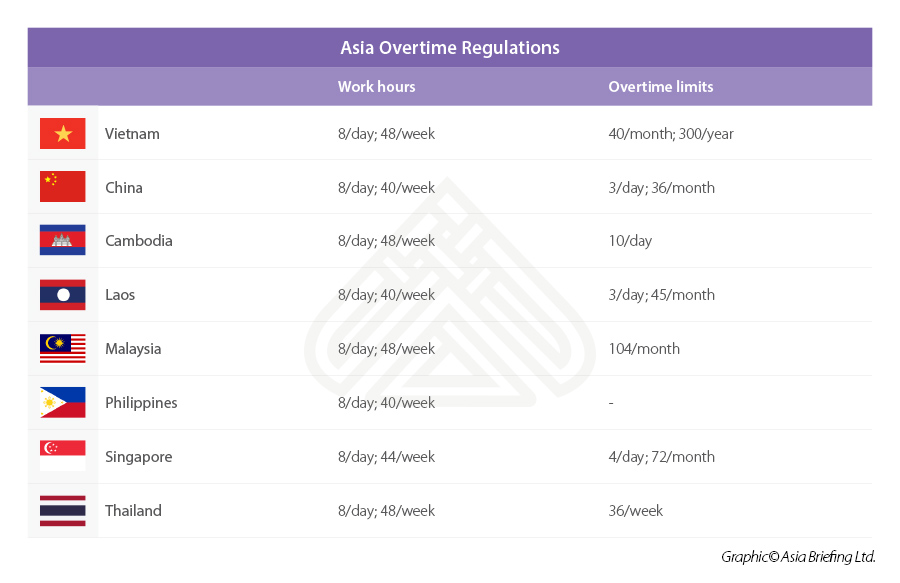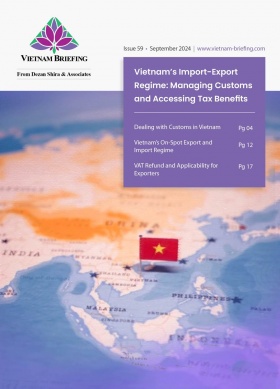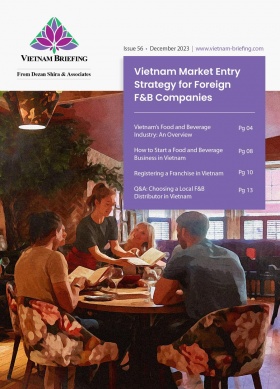Overtime Regulations and Compensation in Vietnam
Overtime hours and regulations in Vietnam pertain to work performed beyond regular working hours. Understanding these regulations is crucial for businesses operating in the country, as it plays a significant role in accurately calculating labor costs. Vietnam Briefing provides an overview of the laws governing overtime hours, the compensation structure, and a comparison with similar regulations in neighboring countries.
When companies turn to Vietnam to establish their manufacturing operations, it is important to not only consider the laws on regular wages, but also the policies on overtime that will be applicable to the workforce and style of a given operation. One of the benefits of Vietnam is that wages are low in comparison to the rest of the region, particularly China.
Overtime and night work policies in the country are essentially the same as those currently employed in China. The Vietnamese government enumerates all of these regulations in the new Labor Law of 2019 (Law No. 45/2019/QH14) and Decree 145/2020/ND-CP. Understanding how these laws and guidance shape costs is of utmost importance for investors seeking to maximize Vietnam’s potential as a low-cost destination for manufacturing.
Triggering overtime
The first consideration that an employer must make is to ensure a thorough understanding of when overtime is applied. Understanding this threshold will allow for the optimization of production targets to customers’ cost and time constraints.
Pursuant to the regulations mentioned above, regular working hours cannot exceed eight hours a day, 48 hours a week. For employees working in heavy or hazardous conditions, the law stipulates that employers are responsible for limiting their working limit due to exposure to dangerous substances or chemicals as per the national technical regulations and relevant laws. If a worker exceeds these limits, overtime compensation will be applied.
In addition to working beyond a set threshold of hours, overtime compensation may be triggered and influenced by the time and date that employees are engaged. Key triggers of overtime beyond hours worked include weekends, public holidays, and night hours – defined as between 22:00 and 6:00.
Vietnam overtime limits
Under Vietnam’s 2019 Labor Code, employers may require employees to work overtime only with their consent. When this condition is met, employers must adhere to the following regulations:
- Daily and monthly limits: Overtime hours cannot exceed 50 percent of the standard working hours in a single day. For employees working weekly schedules, the combined total of regular and overtime hours must not exceed 12 hours per day or 40 hours per month.
- Annual limits: Total overtime hours must not exceed 200 hours per year, except in specific cases outlined by law.
- Extended annual limits: A maximum of 300 overtime hours per year is permitted in certain cases*, including:
- Manufacturing or processing of textiles, garments, footwear, electronics, agricultural, forestry, or aquaculture products, and salt production.
- Activities related to electricity generation and supply, telecommunications, refinery operations, and water supply and drainage.
- Work requiring specialized skills unavailable in the labor market at the time.
- Urgent tasks that cannot be postponed due to seasonal demands, material availability, unforeseen circumstances, adverse weather, natural disasters, fires, hostility, power shortages, or technical issues in production.
- Other cases as prescribed by the Government.
Note: *In instances where extended overtime limits apply, employers are required to notify the provincial labor authority.
Overtime compensation
In the event that a company triggers overtime, they will be obligated to compensate employees beyond the wages that are outlined in their contract. This is applicable to all employees regardless of the wages that are offered. The following are the percentages in excess of standard that are to be applied in the event that certain work-related thresholds are crossed.
|
Overtime calculation in Vietnam |
|
|
Overtime type |
Formula |
|
Overtime compensation based on hourly wage (daytime) |
Overtime wage = Normal hourly salary x Compensation Rate (150%, 200%, or 300%) x Number of overtime hours |
|
Overtime compensation based on products (daytime) |
Overtime wage = Unit price of product wage of normal working day x Compensation Rate (150%, 200%, or 300%) x Number of extra products |
In cases where an employee works extra hours at night, they are paid extra in accordance to the applicable regulations. Further, employees who are given time off in compensation for working extra hours will need to be paid the difference between their wages during normal working hours and overtime work. Finally, employees who work night shifts should be paid at least 30 percent higher than normal.
Pregnant women, women with babies, and minor employees
Women that are in their seventh month of pregnancy and women with babies under 12 months are not allowed to work overtime, work at night, or take long-distance business trips. Further, pregnant women that are performing heavy work, must either be transferred to lighter work or decrease daily work time by an hour, while maintaining the same total pay.
The Vietnam Labor Code also establishes strict regulations for minor employees, which are workers under the age of 18. They are prohibited from working in dangerous conditions or with potential exposure to toxic substances. The Ministry of Labor, Invalids and Social Affairs (MoLISA) also establishes a limit on which industries and what kind of work minors can undertake.
Minor employees between the ages of 15 and 18 can work a maximum of eight hours a day and 40 hours a week. They are only permitted to do overtime and night work in certain industries, as specified by the Ministry. For workers under the age of 15, regulations establish maximum hours at four hours a day and 20 a week, with no overtime or night work permitted. Working hours for those under 13 years of age is further reduced to one hour per day.
Vietnam vs China
The Labor Law of China establishes similar regulations for their employees. Employees working overtime must be paid at a rate of at least 150 percent; for work done during rest day/weekend, 200 percent; for work during a holiday, 300 percent. China has stricter rules regarding the amount of overtime work than Vietnam. Chinese workers are limited to only an hour of overtime work per day and three hours if it is a special circumstance. The monthly limit is 36 hours.
As Chinese wages continue to rise and the economy transitions towards a more efficiency-based structure of production, Vietnam and the wider ASEAN region has increasingly been tapped as the next factory of the world. Those looking to explore opportunities in ASEAN’s growing manufacturing base must be aware of the nuances found within the region and tailor their operations accordingly.
Note: This article was first published in August 2016. It was last updated December 18, 2024.
About Us
Vietnam Briefing is published by Asia Briefing, a subsidiary of Dezan Shira & Associates. We produce material for foreign investors throughout Asia, including ASEAN, China, and India. For editorial matters, contact us here and for a complimentary subscription to our products, please click here. For assistance with investments into Vietnam, please contact us at vietnam@dezshira.com or visit us at www.dezshira.com.
Dezan Shira & Associates assists foreign investors throughout Asia from offices across the world, including in Hanoi, Ho Chi Minh City, and Da Nang. We also maintain offices or have alliance partners assisting foreign investors in China, Hong Kong SAR, Dubai (UAE), Indonesia, Singapore, Philippines, Malaysia, Thailand, Bangladesh, Italy, Germany, the United States, and Australia.
- Previous Article Giorni festivi in Vietnam per il 2025: il Primo Ministro approva la pausa di 9 giorni per il Capodanno lunare
- Next Article Q&A: Personal Income Tax Finalization in Vietnam










